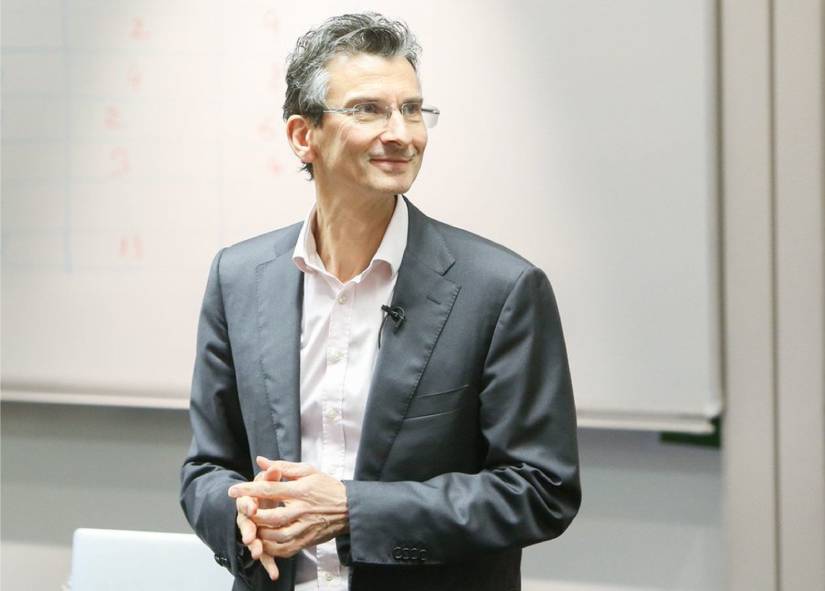Cognitive Diversity and Organisational Performance
August 17, 2021
David Lewis is Director of London Business School’s Senior Executive Programme and teaches on strategy execution and leading in uncertainty. He is regularly published in both the Harvard Business Review and London Business School’s online comment platform ‘think’.
In 2017, he co-authored an article with Alison Reynolds for HBR, titled: ‘Teams Solve Problems Faster When They’re More Cognitively Diverse’
Why is cognitive diversity important and how can it help organisations?
It’s important to understand what we mean by cognitive diversity. Cognitive diversity is the differences between us in the way in which we think about, interpret and respond to change – our instinctive approach to new uncertain complex situations. These are differences between us that I cannot tell by gender, age and ethnicity. But you can see it when people are faced with a new, uncertain and complex situations. For example, some people focus on all the possibilities to be explored; others will focus on what needs to be safeguarded. In this simple example we see why cognitive diversity is important. It’s critical to both explore and develop new options and to safeguard important capabilities that we currently have, if we are to succeed in the face of change.
What is driving the focussed attention on cognitive diversity and what impact do you predict it will have on the future of business?
Rightly, there’s been a lot of focus on social and identity diversity, both because we want an inclusive world in which people from different backgrounds are able to contribute and because we know social diversity contributes to performance. But what people have also come to recognise is that you can have a lot of social diversity and still have ‘group think’. People seem to take the same approach when faced with new, uncertain and complex situations. This has led to an interest in cognitive diversity. The impact is clear, our research repeatedly shows that teams that are more cognitively diverse perform better at many of the challenges we face in business. I see more CEOs and senior executives asking the question do we have enough cognitive diversity and, if we do, are we making the most of it.
Is there overlap between cognitive diversity and identity diversity (age, gender, ethnicity)?
As always, when we attempt to understand and analyse the complex systems that we are as people, we end up oversimplifying things. While it’s important and useful to make the distinction between social diversity and cognitive diversity they are related. Our social context, our gender and ethnicity, impacts our experience in the world, which in turn reinforces aspects of the way in which we think, particularly when we are young. It’s fair to say that our cognitive differences are a combination of nature and nurture. But it is important to remember that you can have a very socially diverse group with the same cognitive preferences and you can have a very homogeneous social group that have very different cognitive preferences.
Are there notable recent public events/decisions that have been impacted by ‘group think’ and a lack of cognitive diversity?
David Cameron initiated the Brexit vote convinced that the British public would vote to remain in Europe. In one of the speeches he used the phrase it’s a ‘slam-dunk’, – it’s a certainty. He was not alone in this belief, senior colleagues and advisors believed the same. It turned out they were wrong. This is an example of groupthink. The Westminster bubble, as it is known, lacks diversity, most of the people are professional politicians, middle-class and spend their time in London talking to and socialising with people like them. We see similar bubbles and the associated groupthink among senior executives in many organisations. They have often served a long time in the business, have a similar educational background and have relatively little experience outside of the business. But there is also often a lack of cognitive diversity, primarily because people like to conform and whilst cognitive diversity may be present, the power of culture and conformity creates a homogeneity of thought.
How can organisations go about achieving greater cognitive diversity?
You can look at teams, using tools such as the AEM-Cube developed by Human Insight to analyse the level of cognitive diversity and include others to increase that diversity where necessary. But often, it’s not so much that there is a lack of cognitive diversity, but rather that it is being suppressed. Here we need to focus on the idea of psychological safety. In a psychologically safe environment people feel confident and free to express themselves without fear of sanction. By fear of sanction I mean social sanction, the loss of esteem and respect of others. Without psychological safety people self-edit, they look to conform and before you know where you are, despite the diversity you have groupthink. Our research shows that six key behaviours enhance psychological safety: curiosity, encouragement, appreciation, flexibility, experimentation, and resourcefulness. If you want greater cognitive diversity practice these behaviours.

